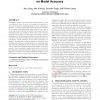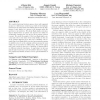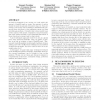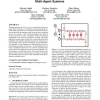ATAL
2015
Springer
8 years 7 months ago
2015
Springer
ATAL
2015
Springer
8 years 7 months ago
2015
Springer
For Markov decision processes with long horizons (i.e., discount factors close to one), it is common in practice to use reduced horizons during planning to speed computation. Howe...
ATAL
2015
Springer
8 years 7 months ago
2015
Springer
To make intelligent decisions, robots often use models of the effects of their actions on the world. Unfortunately, it is often infeasible to have the perfect knowledge and compu...
ATAL
2015
Springer
8 years 7 months ago
2015
Springer
The leading approach for computing strong game-theoretic strategies in large imperfect-information games is to first solve an abstracted version of the game offline, then perform...
ATAL
2015
Springer
8 years 7 months ago
2015
Springer
We consider fractional hedonic games, where self-organized groups (or clusters) are created as a result of the strategic interactions of independent and selfish players and the h...
ATAL
2015
Springer
8 years 7 months ago
2015
Springer
In this paper we present the emigo platform, an agent-based social platform for the Web. Our goal is to provide each Web user with an agent called emigo which represents the user ...
ATAL
2015
Springer
8 years 7 months ago
2015
Springer
It would be desirable if, as a society, we could reduce the amount of landfill trash we create, the amount of carbon dioxide we emit, the amount of forest we clear, etc. Since we...
ATAL
2015
Springer
8 years 7 months ago
2015
Springer
Plurality voting is perhaps the most commonly used way to aggregate the preferences of multiple voters. The purpose of this paper is to provide a comprehensive study of people’s...
ATAL
2015
Springer
8 years 7 months ago
2015
Springer
This paper presents pipelined consensus, an extension of pair-wise gossip-based consensus, for multi-agent systems using mesh networks. Each agent starts a new consensus in each r...
ATAL
2015
Springer
8 years 7 months ago
2015
Springer
d Abstract) Guglielmo Gemignani Sapienza University of Rome




